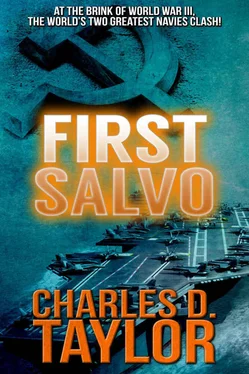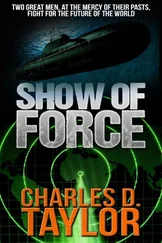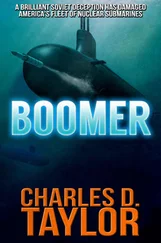The second torpedo hit below the carrier’s island, penetrating through the voids into the fuel trunks before exploding. The blast raised a fireball almost to Kennedy ’s bridge. She was now operating on just her port engines, her speed cut drastically. Water engulfed electrical switchboards, and critical sections of the ship began to lose power.
Electricity had returned just moments before to Pratt’s flag plot when once again the power was lost. This time, smoke filtered through ventilating shafts into the darkened space. Nothing is initially so terrifying on a ship as darkness combined with smoke. In this case, Pratt’s flag plot was buried in the interior of the island. There were no ports to open. No matter where a hatch was opened, there would be only darkness punctuated by the smoke-narrowed beams of battle lanterns.
Kennedy ’s captain called down to Pratt. “Admiral, we have fires out of control on the hangar deck from midships aft. Damage Control reports a danger to ammunition storage because they have no pressure in the watermains there. I’m flooding midships now to contain the fires in the engineering spaces.”
“How much time to return to full speed?”
“We’re not going to, Admiral. We’ve lost the starboard engines. Shafts are likely warped.” The captain hesitated. “Admiral, you may want to think about shifting your flag.” Pratt considered for a moment, then responded, “I’ll bring Yorktown alongside.”
There was a pause, then, “Admiral, perhaps you’d better come to the bridge. Yorktown appears to have taken a hit too. Can’t tell what it was. Too much smoke now.”
One of the stern torpedoes from Odessa had hit Yorktown.
For an unknown reason, the depth setting had been high.
It burst as it hit the hull at the waterline. The blast opened the number-one engine room to cascading seawater. The turbines, though they survived blast damage, were immediately shut down as the water rose toward them. Yorktown proceeded at reduced speed on her starboard shaft.
What had been missed initially on the first report to Carleton was the structural damage the explosion caused to the forward generator. The pumps were unable to keep up with the rising water. Before the generator could be shut down, the water got in and the generator short-circuited, burning itself out. As the one remaining generator began to overload, it also began shedding power to various spaces.
The red lights dimmed in CIC. The hum of fans, previously unnoticed, attracted attention as their motors began to slow down. The interior communications speaker by Carleton’s place echoed into life. “Captain,” came the frantic voice of the engineering officer, “we’re down to one generator. I’ve got to cut off something up there. The AEGIS system’s drawing all the power.” His high-pitched voice cut through the silence of CIC.
“Not a chance.”
“Captain, if I don’t, I’m going to burn the son of a bitch up. Then you got nothing.”
Carleton was familiar with the tone of voice. The man was responding now to his training, following the damage-control book by the numbers. If you follow step one, then the following happens. Follow step two, such and such happens. That was fine, but only for exercises.
“What do you have to shut down to keep us going up here?”
“Practically everything, Captain — shut down the gun mounts, the missile launchers. Hell, I don’t even know if I can keep the starboard engines running if I concentrate on the electrical system.”
“Just keep turning things off until you’re safe.” All he really needed was AEGIS. Though his own magazines were getting low, there were still enough ships in the area. As long as AEGIS could keep them firing…
“Captain… I’m losing power here.” It was his CIC officer, his voice cracking. He hesitated, moving from one location to another, checking his instruments. He turned to Carleton, barely visible in the dimming red light. “ We’re going to go out of automatic .” He spoke each word separately and distinctly, the fear of failure imminent.
Carleton hit the button on the IC communicator in front of him. “Cut everything,” he bellowed into the box. “Go dead in the water. I don’t give a shit what you do, but don’t cut us anymore up here.”
“I’m doing everything I can, Captain.” There was a pause, the sound of machinery in the background the only indication that the line was still open. “That’s it, sir. Losing way…”
A voice cut into Carleton’s thoughts from another speaker. “Captain. Bridge here. We’re losing steerageway. The compass is out of sync.” There was another hesitation. “Captain… we’ve lost everything up here.”
It was at that moment that Carleton recognized Dave Pratt’s voice above the disciplined commotion in CIC. The Admiral was requesting an assessment of casualties. Carleton responded directly himself, then Pratt asked: “Tom, have you still got full control with AEGIS?”
“Affirmative, Admiral, but we’re dead in the water for the time being. I have no idea if we’ll get a second generator back on line.”
“I’ll take my chances, Tom. I’ve lost the picture completely here. There’s a helo waiting for me on the flight deck now.”
Yorktown did have to use her engines briefly to maneuver enough to clear the smoke from her stern so that Dave Pratt could be lowered from the helo. With the missile damage and the fires still smoldering below, there was no way they could land.
The remainder of the Battle of the Mediterranean would be directed from a ship unable to maneuver.
Ryng found the going much easier in the shadows. There the snow was harder than the crystallized slush melted by the sun’s limited heat. In shadows, he slipped occasionally where ice had formed or where small, unseen projections caught his feet.
He did not look back. His one goal was to get to the other side of the peak before another helicopter came looking for the first one. If Harriers had flown in from the direction of the ocean, there was the possibility of help that way.
A new sound came to him as he neared the top. At first it was a low hum, steady, occasionally increasing in pitch. The closer he came to the peak, the louder, deeper, and more resonant it became. Whatever it might be, Ryng had little concern. Rather than frightening him, it seemed to draw him toward the peak, to what he was sure was freedom from the chase.
The last hundred yards he could see multicolored snow crystals caught in the sun’s rays as they swirled around the bare rock at the top. They were propelled by a steady wind rolling off the ocean and reaching a crescendo as it blew through the rock and ice formations to create that strange yet welcoming sound. Here the snow, constantly moving, was deeper and softer, and the last few yards were the most difficult as he struggled through the drifts.
From the top, he gazed out over an angry gray, white-capped ocean. The reverse of the long slope he had just climbed was much sharper; the snowfield swept down at an acute angle, and jagged rock outcroppings peered through a much thinner snow cover. The constant wind blew much of the snow on that side over the peak, to drift where Ryng now stood and eventually to add to the year-round glacier that he had climbed that day. Below, the surface was smoother and less steep, like the inside of a coffee cup.
Shielding his eyes with both hands, he slowly searched the horizon for any sign of life, even the smallest fishing boat, but nothing was apparent. Ryng shrugged to himself. What the hell — life had to be better down there than it had been here for the last nine or ten hours.
Читать дальше












